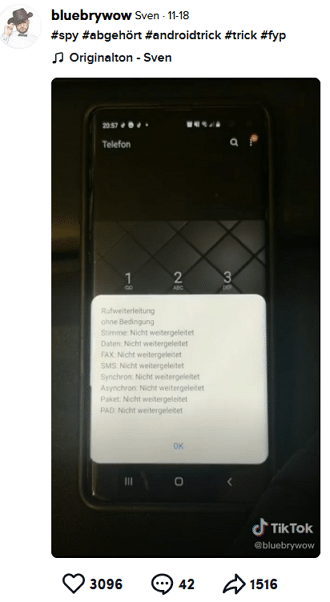There is currently a video on TikTok and CO that claims in an alarmist tone that you can use a special key code to find out who is tapping your cell phone. The video can be found HERE . A screenshot from the TikTok post:

The video says > “Enter *#21#…”
“Attention, you want to know if you are being listened to? Then enter *#21#. Then this field comes here and if it says “Not forwarded” or “Deactivated”, then you are safe. If there is a number there, just quickly enter *#62# and then you will see where or who is listening to you.”
What the codes really do
The key codes are so-called GSM codes, which have been around since the first cell phones in order to be able to quickly set and change certain functions. These also work conveniently on smartphones.
There are both general and device-specific codes that only work on Samsung or Huawei devices, for example. The above codes are among the general codes that work on every smartphone.
A detailed list of codes can be found, for example, on Heise ( see HERE ), where we can also see what the above codes really mean:
- *#21# = Status query of call diversion for calls
- *#62# = Status query of call diversion when unavailable
With these codes you can do nothing other than check whether you have set up call forwarding.
Other codes, for example, mean that your own phone number is not transmitted when calling (#31# ), you can display your own phone number - after all, you tend to forget your own number (*135#) or a change in your PIN (**04*old PIN*new PIN*new PIN#).
Conclusion: If you are afraid of being listened to, you cannot find out by simply entering a code. This requires special programs that scan the smartphone for the appropriate software. A more common method is to intercept data packets at network exchanges.
However, most people are probably too uninteresting to be listened to. 😉
Notes:
1) This content reflects the current state of affairs at the time of publication. The reproduction of individual images, screenshots, embeds or video sequences serves to discuss the topic. 2) Individual contributions were created through the use of machine assistance and were carefully checked by the Mimikama editorial team before publication. ( Reason )

